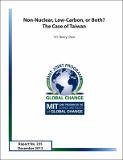| dc.contributor.author | Chen, Y.-H. Henry | |
| dc.date.accessioned | 2012-12-14T18:45:07Z | |
| dc.date.available | 2012-12-14T18:45:07Z | |
| dc.date.issued | 2012-12 | |
| dc.identifier.uri | http://hdl.handle.net/1721.1/75733 | |
| dc.description.abstract | The Fukushima nuclear accident in Japan has renewed debates on the safety of nuclear power,
possibly hurting the role of nuclear power in efforts to limit CO2 emissions. I develop a dynamic
economy-wide model of Taiwan with a detailed set of technology options in the power sector to
examine the implications of adopting different nuclear power policies on CO2 emissions and the
economy. Absent a carbon mitigation target, limiting nuclear power has a small economic cost for
Taiwan, but CO2 emissions may increase by more than 3.5% by 2035 when nuclear is replaced by
fossil-based generation. With a low-carbon target of a 50% reduction from year 2000 levels by
2050, if the nuclear option and carbon sequestration are not viable, gas-fired power would
provide almost 90% of electricity output due to the limited renewable resources. In particular,
wind power would account for 1.6% to 4.9% of that output, depending on how it relies on other
back-up capacities. With both non-nuclear and low-carbon policies, deploying carbon
sequestration on fossil-based generation can significantly reduce the negative GDP impact on the
economy. Lastly, lowering carbon mitigation costs further is possible with expanded nuclear
capacity. | en_US |
| dc.description.sponsorship | The author gratefully acknowledges comments and suggestions from John Reilly, Frank Hsiao,
Audrey Resutek, and seminar participants of the MIT EPPA meeting, and the financial support
from the MIT Joint Program on the Science and Policy of Global Change. The Program is funded
by the following institutions under various grants: the U.S. Department of Energy; the U.S.
Environmental Protection Agency; the U.S. National Science Foundation; the U.S. National
Aeronautics and Space Administration; the U.S. National Oceanic and Atmospheric
Administration; the U.S. Federal Aviation Administration; the Electric Power Research Institute;
and a consortium of industrial and foundation sponsors (for complete list see
http://globalchange.mit.edu/sponsors/all). | en_US |
| dc.language.iso | en_US | en_US |
| dc.publisher | MIT Joint Program on the Science and Policy of Global Change | en_US |
| dc.relation.ispartofseries | Joint Program Report Series;235 | |
| dc.rights | An error occurred on the license name. | en |
| dc.rights.uri | An error occurred getting the license - uri. | en |
| dc.title | Non-Nuclear, Low-Carbon, or Both? The Case of Taiwan | en_US |
| dc.type | Technical Report | en_US |
| dc.identifier.citation | Report 235 | en_US |
